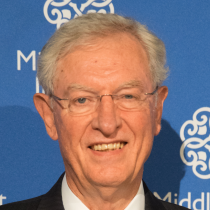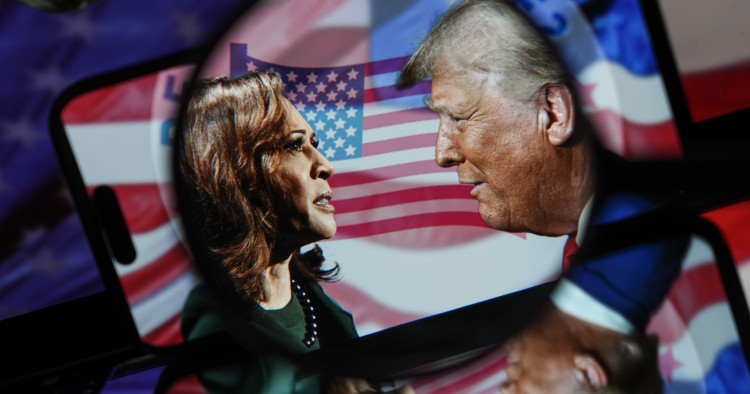Contents:
- Harris vs. Trump: Two competing visions on the Middle East
- How the next administration handles Middle East challenges will depend as much on Washington politics as it will on the region
- De-escalation in Lebanon is becoming feasible even as cease-fire talks on Gaza continue to fail
- Iranians worry about Russia’s dependability as a strategic partner
- Next steps to dismantling democracy in Turkey
Harris vs. Trump: Two competing visions on the Middle East
Brian Katulis
Senior Fellow for US Foreign Policy

-
The Middle East has mostly been an afterthought pushed to the margins in this year’s election campaign, but whoever wins the presidency and control of Congress will have the ability to shape America’s approach to the region in the long run.
-
Vice President Kamala Harris and former President Donald Trump have competing styles and visions for the Middle East, but actors in the region will continue to be the main drivers of events for months to come.
America is focused on who will win the race for the White House and whether the world will have a clear answer to that question in a matter of hours, weeks, or possibly months, depending on how close the vote is and whether the legitimacy of the results will be challenged in the courts or the streets.
This year’s election takes place at a time of great geopolitical uncertainty, especially in the Middle East. Despite the ongoing wars and tensions, the region has not been in the main spotlight in America’s campaign debate this year. What is existential for many people in the Middle East — whether they and their families will survive the current wars — is incidental in the minds of most American voters.
Both Harris and Trump have staked out different visions and positions on key Middle East issues, as noted in the Middle East Institute’s candidate position tracker, including a more detailed essay on the candidates’ views on Iran and Israel-Palestine. The biggest difference between the two leaders is likely more in style, rather than substance. Trump prides himself on his unpredictability and setting America’s adversaries and partners off balance with unexpected moves, whereas Harris is cut from the same cloth as President Joe Biden and will likely maintain a technocratic managerial approach to Middle East matters, including on major issues like Iran.
The main thing to watch for in the immediate period is what happens in the next two and a half months in the Middle East. Events are driven these days mostly by actors in the region, and Biden’s strategic drift has incentivized key regional powers and non-state groups to take matters into their own hands, with the US playing a more modest role in preventing worse outcomes from emerging. Biden can take some steps to reverse the negative spiral and improve the situation for his successor, but major leaps forward in the broader regional environment appear unlikely between now and January.
The main thing to expect from US policy in the Middle East in the early stages of 2025 is that it will likely remain reactive to the actions of the key players — countries like Israel and Iran, and groups like Hamas and Hezbollah. It will take a new US administration several weeks or perhaps months to get a team in place. The US military will continue to play an important role in shaping the strategic landscape, but it seems unlikely to make any major moves except in reaction to what happens in the region.
A key factor to watch in early 2025, no matter who wins the presidency, is who controls the two houses of Congress. In America’s political system, Congress plays an important role in approving budgets that fund America’s foreign engagements, offering oversight of the policies of the executive branch, and confirming key nominees for positions that run US policy.
Which party will control the legislature, or whether the same party even holds a majority in both chambers, looks like a tossup on the day of the election — America’s voters are as divided on the state campaigns as they are on the presidential race. A key question for the future of US policy in the Middle East is whether a new bipartisan coalition of support can be built in the way similar coalitions of Democratic and Republican lawmakers were constructed over the past few years to carry forward a consistent US policy toward China and to some extent Russia. Absent this, the question of US Middle East policy could be used in a neo-Orientalist way to fragment and divide Americans along ideological and partisan lines.
The great uncertainty in today’s Middle East is mirrored by equally large uncertainties about America’s politics as voters head to the polls.
Follow: @Katulis
How the next administration handles Middle East challenges will depend as much on Washington politics as it will on the region
Gerald M. Feierstein
Director, Arabian Peninsula Affairs Program, and Distinguished Sr. Fellow on US Diplomacy

-
Stabilizing Israel’s current conflicts with Hamas and Hezbollah and determining a way forward with Iran will be two of the most urgent regional issues confronting the next US administration.
-
The greatest policy challenge might be closer to home though, given the pressing need to find a path forward amid deep political polarization in Washington and the absence of any consensus on how to approach regional issues.
Given the likelihood that Israel’s current conflicts with Hamas and Hezbollah and their aftermath, as well as tensions with Iran, will not be resolved before the next US administration takes office on Jan. 20, the first order of business for the incoming team will be to seek a sustainable way to stabilize the situation and prevent a new round of violence. While Israel has demonstrated that it enjoys complete regional dominance militarily, its operations in Gaza, southern Lebanon, and against Iran have come at considerable cost to its international reputation and standing as well as deepened its domestic political divisions. Reacting in horror to the unfolding debacle in Gaza after the Oct. 7 Hamas terror attack, the international community is more focused on the Israeli-Palestinian conflict now than it has been for many years. The new US leadership will need to find a means to channel international, especially Gulf Arab, engagement into productive ends that will help Gazans rebuild their lives, homes, and communities, establish new governing and security institutions for Gaza, and pave the way for a new push to a political resolution of the underlying conflict. Successful negotiations to end the conflict will undoubtedly require new political leadership in both Jerusalem and Ramallah and will, therefore, require time. But the administration can begin the process by coordinating with its Arab and European partners, as well as perhaps with Russia and China, to be prepared to move as soon as the regional political environment permits.
Determining a way forward with Iran will be the second challenge confronting the new administration. Whether it’s a Harris or Trump administration as of January, they will confront a very different situation than either the previous Trump or the Biden administration faced. Iran is perceptibly weaker since the outbreak of conflict a year ago, having lost key Palestinian and Hezbollah allies as well as being seemingly incapable of either seriously threatening Israel or defending against its overt and covert attacks. Yet Iran is not without advantages. Its critical support of Russia’s aggression in Ukraine has cemented its ties to Moscow while maintaining its close relations with China as evidenced by the invitation to join the BRICS group. Moreover, unlike a decade ago, the Gulf states have made clear that they do not want to be drawn into a military confrontation with Iran and have expressly declared their neutrality in the Israel-Iran conflict. Thus, should the US with Israel seek to return to a pressure campaign against Iran, they will find that the leverage they enjoyed previously will be hard to re-establish. The new Iranian leadership, however, has expressed some interest in improving relations with the US and the West. Therefore, an effort to engage Iran might bear fruit and would be certainly welcomed by the Gulf states, although it would leave Israel more isolated on that score.
While designing a policy to address Israeli-Palestinian issues as well as Iran’s regional threat may present daunting challenges for the new administration, the biggest challenge may well rest in Washington rather than the Middle East. Deep political polarization and the absence of any consensus on how to approach regional issues will leave administration policies vulnerable to attack while knee-jerk support for Israeli policies, no matter how extreme or distant from long-standing US preferences, makes the search for broadly acceptable outcomes difficult at best. Thus, first and foremost, the challenge that the new administration will face will be the requirement to rebuild the US domestic consensus and find a path forward that can win acceptance, perhaps grudgingly, from both sides of the aisle.
De-escalation in Lebanon is becoming feasible even as cease-fire talks on Gaza continue to fail
Nimrod Goren
Senior Fellow for Israeli Affairs

-
The US resumed its mediation toward cease-fires in Gaza and Lebanon in the context of the killing of Hamas and Hezbollah leaders and the impending presidential election.
-
The results of this effort highlighted Prime Minister Benjamin Netanyahu's wish to prolong the crisis in Gaza, but also indicated that a separate de-escalation arrangement on Lebanon may be within reach.
Recent weeks saw another effort by the United States and other mediators to advance cease-fires in Gaza and Lebanon. The killing by Israel of Hamas leader Yahya Sinwar and Hezbollah leader Hassan Nasrallah sparked renewed optimism in Washington that the hurdles may now be easier to overcome. The Biden administration, hoping the new conditions could produce a pre-election diplomatic win, sent its envoys to the region once again. A breakthrough was not made, but changes from previous rounds were evident.
On Gaza, the mediators now seem to understand that the three-phase cease-fire formula they have been promoting is not achievable. The gaps between Hamas and Israeli Prime Minister Benjamin Netanyahu are too large to bridge. New formulas for a smaller deal were presented by Egypt and Qatar, offering to start with a limited cease-fire (up to a month) and the return of a few (up to 11) Israeli hostages. Netanyahu indicated openness to a formula that does not necessitate withdrawing Israeli forces from Gaza and ending the war, but this did not meet Hamas' demands.
“Chances for a small deal are low,” Mossad Chief David Barnea told hostage families. “Every 10 days, on average, one hostage dies,” an Israeli official warned the Cabinet. A recent investigation of a close Netanyahu aide supposedly shows how sensitive intel was leaked to purposely damage hostage release efforts. Netanyahu seems determined to prolong and consolidate the Israeli military presence within the Gaza Strip, even if it harms the prospects for further hostage releases.
While talks on Gaza have stagnated, signs of progress have emerged regarding Lebanon. Throughout the year, the mediators' assumption was that an Israel-Hezbollah de-escalation arrangement could be implemented only after a cease-fire in Gaza was reached. Following Israel's recent achievements against Hezbollah, this notion began to be reversed, not only in the US but also from within Lebanon.
Just before US mediator Amos Hochstein headed to Israel last week, Lebanon's caretaker Prime Minister Najib Mikati expressed unusual optimism that a cease-fire with Israel would be announced within days. In parallel, senior Israeli officials claimed there was progress on an agreement to end the fighting in Lebanon, and a draft US-brokered agreement was leaked to the Israeli media.
From Israel's side, a prolonged military presence in Lebanon is not a priority, in contrast to Netanyahu's stance on Gaza. There is no ideological rationale for controlling Lebanese territory, Israel has a history of negative experiences from previous interventions in the country, and Israeli society is sensitive to the loss of soldiers there.
Instead, a mainstream Israeli aspiration is to get the job done against Hezbollah, enable displaced residents of Israel's north to return home, put the necessary security safeguards in place, and withdraw from Lebanon. For that, an Israel-Hezbollah deal that is delinked from Gaza is being sought and seems more likely than before.
Both US presidential candidates have indicated their wish to see the wars in Gaza and Lebanon wrapped up before entering office. During the period between the Nov. 5 presidential election and the Jan. 20 transition, efforts should be made to reach an agreement on Lebanon, at the very least.
Follow: @GorenNimrod
Iranians worry about Russia’s dependability as a strategic partner
Alex Vatanka
Director of Iran Program and Senior Fellow

-
Following Israel’s Oct. 26 strikes on Iran, Moscow’s stance came under widespread Iranian criticism, reinforcing many Iranians’ long-held view of Russian duplicity.
-
Backers of President Masoud Pezeshkian are urging him to dispel the notion that Russia, or China for that matter, is the magic solution to Iran’s many domestic and foreign challenges; they hope he can push the supreme leader and the Revolutionary Guards to break the taboo around negotiating directly with the Americans.
Iran vows another round of retaliation against Israel; but outwardly at least, those threats haven’t been echoed or backed up by any of Tehran’s so-called friends. Whether Iran is on its own is hotly debated domestically these days. In particular, the utility of Russia as a partner is being scrutinized like never before. This uncertainty around Russia’s dependability is not only driven by concerns about ongoing tensions between Iran and Isreal but also by questions about what sort of foreign policy best serves the Iranian national interest in the long term. Plenty of Iranian commentators are calling for a major rethink even as there are reports of a new Iranian-Russian strategic agreement to be signed by the end of 2024.
Following Israel’s Oct. 26 strikes on Iran, Moscow’s stance came under widespread Iranian criticism. The anger was evident during a press conference at the foreign ministry in Tehran, when a journalist attacked Russia as “dishonorable” and fickle — for allegedly taking from Iran but giving nothing back. In a country with tight media oversight, this outburst was very likely choregraphed and hardly happenstance. It was Tehran signaling to Moscow that the latter’s silence following the Israeli attacks — which reportedly also targeted Russian-supplied S-300 anti-air systems — was not appreciated.
Anti-Russian sentiment has long been common in Tehran, even among supporters of the Islamist regime. Many Iranians see habitual Russian duplicity at play, whether it is Moscow’s recent promotion of the Zangezur corridor in the South Caucasus (which Iran opposes) or Russian support to the United Arab Emirates for the three disputed islands in the Persian Gulf. As one Iranian analyst put it, “Russia does not sign up for strategic alliances with Iran or any other country. Russia can easily change its relations and agreements with any country in less than 24 hours.”
Such assessments are meant to prod officials in Tehran to stop trying to sell the illusion of closer ties to Moscow as an effective counter-balance to deeply strained relations with the West and specifically the United States. While Russian Foreign Minister Sergey Lavrov has predicted that Iran and Russia will soon renew a new long-term strategic cooperation agreement, backers of President Masoud Pezeshkian are urging him to dispel the notion that Russia, or China for that matter, is the magic solution to Iran’s many domestic and foreign challenges.
In fact, calls for Pezeshkian to break the taboo around negotiating directly with the Americans are becoming louder. No one expects the Iranian president to introduce any radical overhauls of the country’s foreign policy: His institutional ability to help set Iran’s strategic course is hugely limited. The question is whether his government can gently steer Supreme Leader Ali Khamenei and the Revolutionary Guards in that direction.
Follow: @AlexVatanka
Next steps to dismantling democracy in Turkey
W. Robert Pearson
Non-Resident Scholar

-
Several recent moves, including the introduction of an “influence espionage” article in parliament, the arrest of an opposition Istanbul deputy mayor, and the removal and replacement of three mayors from the pro-Kurdish party, suggest the Turkish government appears to be trying to further tighten its control over the country.
-
The proposed “influence espionage” legislation would give the government the sole right to define what is in the country’s strategic interest — a move that would likely have a chilling effect on free speech, intimidating citizens and press to practice self-censorship.
The Turkish government appears to be moving to impose new restrictions on citizen rights in a bid to further tighten its control over the country.
Turkey’s constitution embraces fundamental principles to function as a “democratic, social state based on the rule of law.” As detailed in a recent piece in the Yetkin Report, an “influence espionage” article introduced to parliament on Oct. 18 to include in Turkey’s constitution poses a direct threat to the freedom of speech and to the clear definition of what constitutes a crime. References to “state security” and “strategic interests” hand the government the sole right to define what is in the strategic interest of the country. The purpose, it seems clear, is to also intimidate citizens and press to practice self-censorship. If adopted, the changes will allow the government to avoid giving any accurate explanation for its actions. These attacks continue to undermine trust among people unhappy with the government and saddled with the economic burden of high costs and high inflation.
A second blow landed on Oct. 30 with the arrest of an opposition Istanbul deputy mayor, Ahmet Özer, on terrorism charges and his removal from office. The main opposition party, the Republican People’s Party (CHP), has claimed that the arrest is part of a wider political agenda. The move has prompted hundreds of demonstrators to take to the streets and sparked strong criticism from the CHP, including from Istanbul’s popular municipal mayor, Ekrem İmamoğlu.
A third blow followed on Nov. 4 with the removal of three mayors from the pro-Kurdish Peoples’ Equality and Democracy (DEM) Party in southeastern Turkey and their replacement by government-appointed trustees. The government said the move against the mayors of Mardin, Batman, and Halfeti was linked to “terrorism investigations.”
These three actions raise the clear question of Ankara’s interest in the control mechanisms of Georgia’s foreign influence law and Hungary’s “national sovereignty” law fashioned after Russia’s “foreign agent” law. After its worst election defeat in party history in the March 2024 municipal elections and the subsequent effort to recover, the Justice and Development Party (AKP) appears to be moving again to weaken the country’s democratic commitments with an eye toward more direct political control.
Photo by Dilara Irem Sancar/Anadolu via Getty Images
The Middle East Institute (MEI) is an independent, non-partisan, non-for-profit, educational organization. It does not engage in advocacy and its scholars’ opinions are their own. MEI welcomes financial donations, but retains sole editorial control over its work and its publications reflect only the authors’ views. For a listing of MEI donors, please click here.













